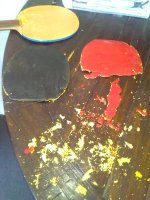This user has no status.
This user has no status.
Active Member
After matches, many players coaches, and teams analyze video point for point, seeing percentage of forehands hit, winning percentage on serves returned on forehand or backhand, etc.. The info is then used to figure out what the player needs to improve.
The reason a coach or player might do this is that they notice weaknesses that they would not notice just by watching the video. So why wouldn't this work during a match? What if a coach has a notebook out and marks down, after each point, some data, for a bunch of criteria. From service type to forehand down the line percentage vs crosscourt percentage to high toss vs low toss serves, amount of points won vs lost for each type of serve, etc.. The coach could take down a lot of data. Then when the game is over the coach will know exactly what is losing the player points and can help.
Might this help? Instead of thinking of a strategy based on watching, think of it based on real data during the match.\
Has this been done before? Any thoughts?
The reason a coach or player might do this is that they notice weaknesses that they would not notice just by watching the video. So why wouldn't this work during a match? What if a coach has a notebook out and marks down, after each point, some data, for a bunch of criteria. From service type to forehand down the line percentage vs crosscourt percentage to high toss vs low toss serves, amount of points won vs lost for each type of serve, etc.. The coach could take down a lot of data. Then when the game is over the coach will know exactly what is losing the player points and can help.
Might this help? Instead of thinking of a strategy based on watching, think of it based on real data during the match.\
Has this been done before? Any thoughts?












